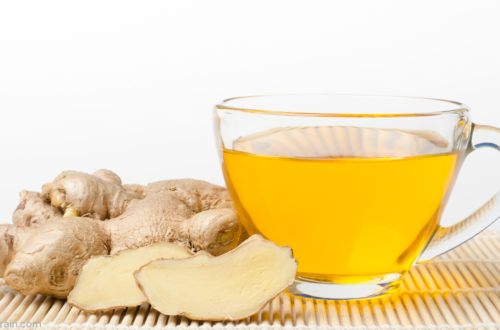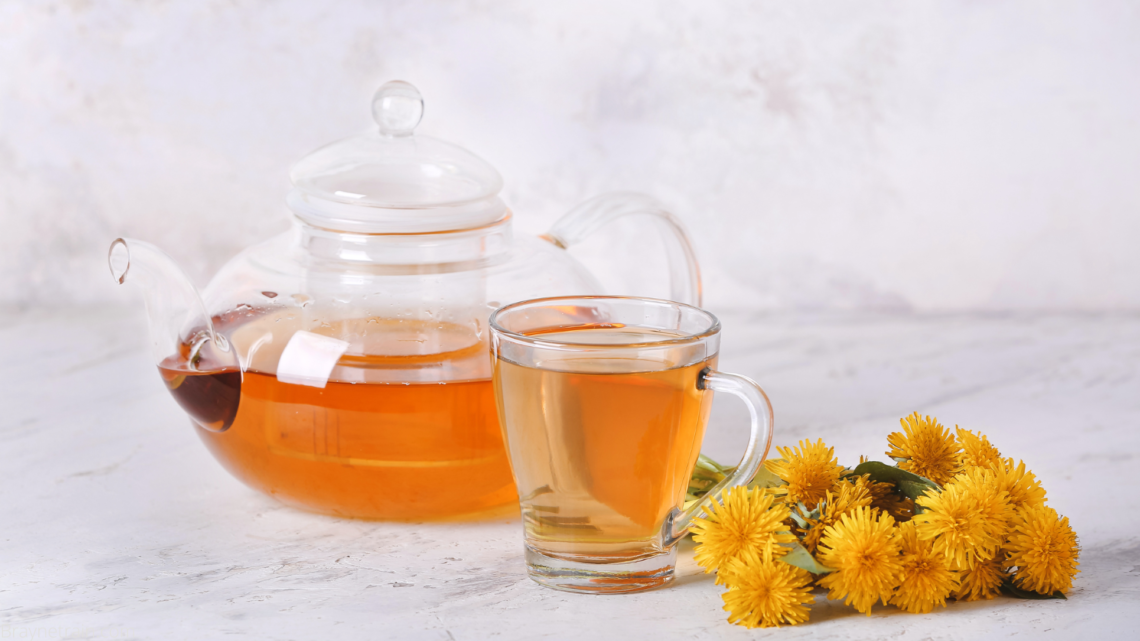
How Many Cups Of Dandelion Tea Can You Drink Per Day?
Dandelions are small yellow flowers that grow in almost any condition.
Interestingly, this flower which is often labeled as a weed, is actually one of nature’s top healing foods, packed with vitamins and minerals.
Dandelion tea is one of the most popular ways of consuming this plant for its benefits.
In general, drinking one cup of dandelion tea twice per day is the amount recommended by nutrition experts. Due to dandelion’s diuretic effect, drinking dandelion tea in the morning and after meals helps keep the digestive tract functioning properly.
This blog post will discuss all there is to know about dandelion tea and its benefits. So continue reading to learn more!
Dandelion Dosage & frequency chart:
Although there are no clear dosage guidelines, due to a lack of enough human research, existing data suggest the following dosages for different forms of dandelion:
| Type | Dosage |
| Fresh leaves | 4 –10 grams daily |
| Dried leaves | 4 –10 grams daily |
| Fresh roots | 2 – 8 grams daily |
| Leaf tincture | 0.4 –1 teaspoon (2–5 mL) three times per day |
| Fluid extract | 1 – 2 teaspoons (5–10 mL) daily |
| Dried powder | 250 –1,000 mg four times per day |
| Fresh leaf juice | 1 teaspoon (5 mL) twice daily |
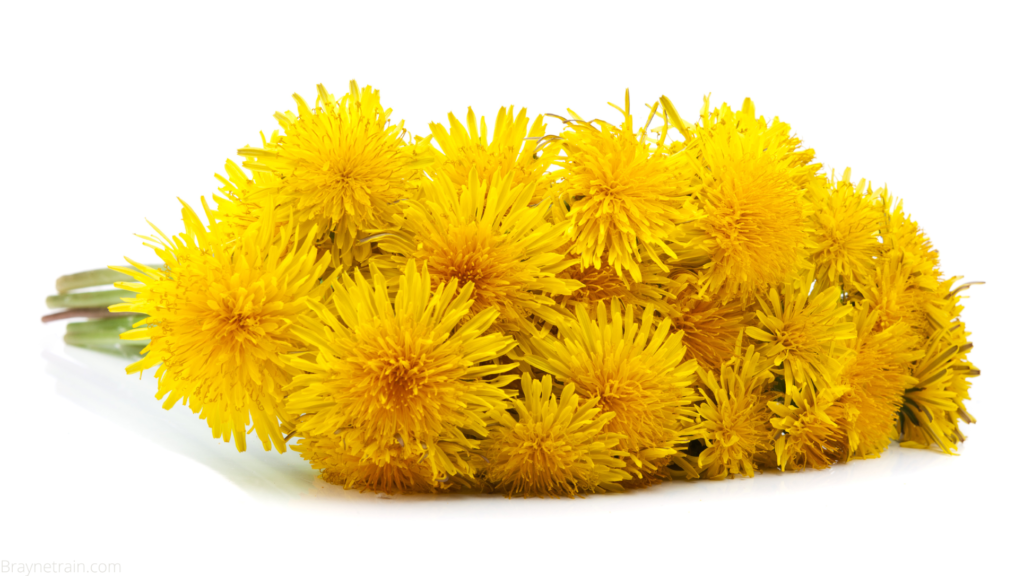
What are Dandelions?
Dandelions, native to Europe, were introduced to North America over four centuries ago and now propagate as wildflowers.
Humans have used dandelions as food and also herb for much of recorded history.
They were used by ancient Egyptians, Romans, and Greeks and are known to have been used in traditional Chinese medicine for over a thousand years.
To learn about the benefits of the herb ashwagandha, click here.
Top 10 Benefits of Dandelion Tea:
Studies on animals and humans have proven dandelion tea to have numerous health benefits.
Dandelions can be consumed cooked or raw, and their root, leaves, or blossom can be brewed into a delicious cup of tea packed with nutrients and minerals.
Some even consider dandelion tea to be a great coffee substitute.
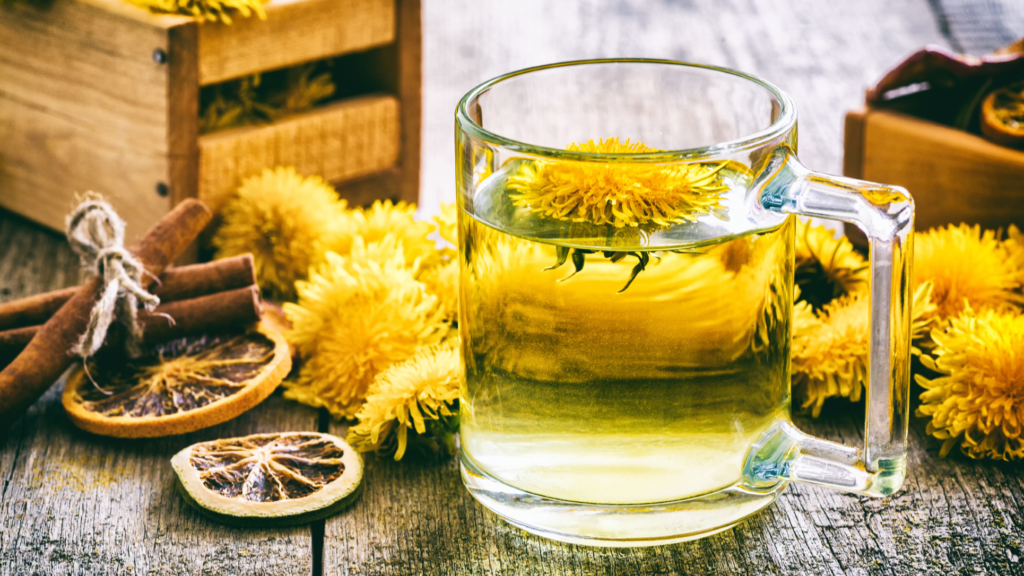
High in vitamins and minerals
Dandelion tea is an excellent source of calcium, potassium, magnesium, and vitamins A, C, and K.
Vitamin K is known to help the blood clotting process, improve cognitive function, and may reduce the risk of cancer and heart disease.
In addition, high amounts of vitamin A and C in dandelions help improve skin conditions such as eczema and psoriasis.
Weight loss
Drinking one or two cups of dandelion tea daily may help you lose weight.
Studies suggest dandelions help promotes fat digestion, improve carbohydrate metabolism, and reduce fat absorption, which can result in weight loss.
Animal studies revealed that dandelion tea contains chlorogenic acid, a polyphenol that can help you lose weight.
In addition, dandelion tea’s diuretic effect helps eliminate bloating and water weight, which results in additional weight loss.
To learn more about ways to lose weight without exercising, click here.
Lowers Blood Sugar
Research suggests drinking dandelion tea can improve type 2 diabetes by lowering blood sugar levels.
Insulin is a hormone in charge of sugar uptake from the bloodstream.
Studies indicate that dandelions can Improve insulin secretion from the pancreas, which helps lower blood sugar.
To learn more about reversing insulin resistance, click here.

Reduces inflammation
Animal studies indicate dandelions may help reduce inflammation.
Inflammation is a normal response to bodily injury; however, chronic inflammation can cause many health problems.
Dandelions contain a compound known as polyphenols which can help reduce chronic inflammation.
To learn more about anti-inflammation diets, click here.
Soothes Digestive Ailments
Dandelions are mild diuretics and can help keep the digestive system functioning correctly.
Drinking dandelion tea after meals can help prevent bloating and speed up digestion.
To learn more about the digestive benefits of eating two dates per day, click here.
Protects the Liver
Drinking dandelion tea helps increase bile flow from the liver, which helps detoxify the liver.
In addition, some studies suggest dandelions can help reduce the amount of excess fat in the liver.
Excess fat in the liver can lead to a condition called fatty liver, which results in several serious health problems.
Therefore, dandelions may help prevent fatty liver by eliminating the excess fat.

prevents urinary tract infection
Due to its diuretic effect, dandelion tea can help clean the kidneys and keep the urinary tract clear, preventing infections.
Builds strong bones
Dandelions are a great source of calcium and vitamin K, which are essential for promoting and maintaining healthy bones.
Studies have indicated that consuming leafy greens such as dandelion leaves may also prevent bone loss and osteoporosis.
More human studies need to be done to confirm this claim.
Boosts Immune system
Scientific studies have shown that dandelion may help boost immunity due to its possible anti-microbial and anti-viral properties.
In addition, research indicates that dandelions may help stop the replication of some viruses and protect against several kinds of bacterial infections.
May Lower Cholesterol
Drinking dandelion tea may help lower overall cholesterol levels.
A four-week study on animals indicated that dandelion leaf extract can effectively reduce cholesterol and triglyceride levels.
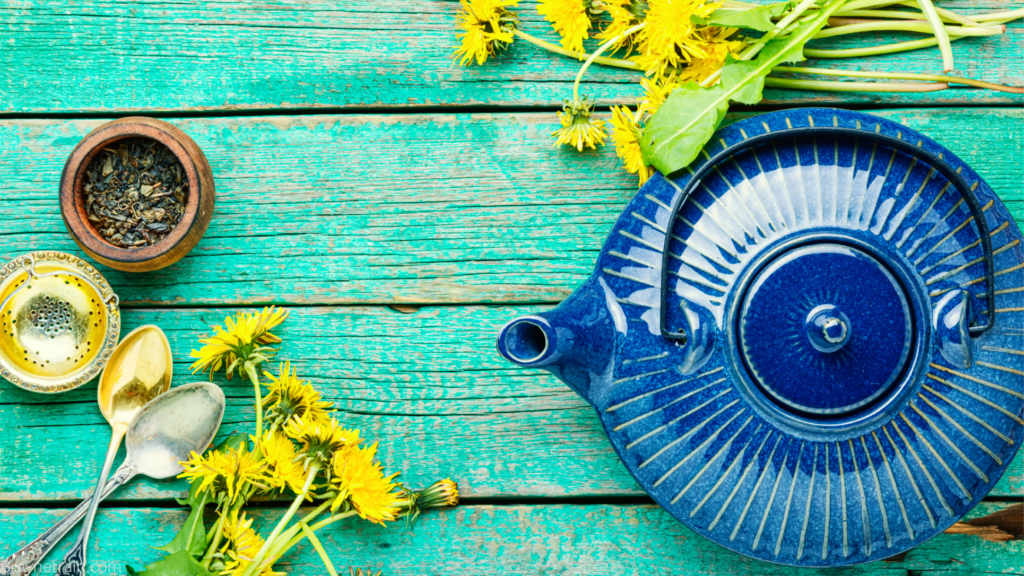
How To Make Fresh Dandelion Tea:
- Gather about a quart of fresh dandelion flowers.
- Roughly 4-5 dandelions make one cup of tea.
- Clean the flower, and remove all the stems and leaves.
- Place the yellow pedals in a colander, and rinse with cold water thoroughly.
- Pour hot water into a large bowl and add the dandelions to the bowl.
- Let it steep for 8-10 minutes.
- Add some honey or stevia and your tea is ready.
- Strain the mixture into a cup.
- Enjoy!
Side Effects Of Dandelion Tea:
Dandelions are generally considered safe.
However, dandelions may reduce the absorption of antibiotics. Therefore, those taking antibiotics should not consume dandelions.
In addition, dandelions may cause an allergic reaction in sensitive individuals. If pregnant or breastfeeding, or if you are taking medications or have a medical condition, talk to your doctor before drinking dandelion tea.
Disclaimer: The information provided by BrayneTrain is based on scientific research and information drawn from medical societies and governmental agencies. However, it is not a substitute for professional medical advice, diagnosis, or treatment.
Takeaway
Dandelion is one of nature’s most fantastic superfoods. Drinking one or two cups of dandelion tea daily can promote weight loss, lower blood sugar, and overall health. Thank you for reading!
References
Wirngo FE, Lambert MN, Jeppesen PB. The Physiological Effects of Dandelion (Taraxacum Officinale) in Type 2 Diabetes. Rev Diabet Stud. 2016 Summer-Fall;13(2-3):113-131. doi: 10.1900/RDS.2016.13.113. Epub 2016 Aug 10. PMID: 28012278; PMCID: PMC5553762.
Yang Y, Li S. Dandelion Extracts Protect Human Skin Fibroblasts from UVB Damage and Cellular Senescence. Oxid Med Cell Longev. 2015;2015:619560. doi: 10.1155/2015/619560. Epub 2015 Oct 20. PMID: 26576225; PMCID: PMC4630464.
Díaz K, Espinoza L, Madrid A, Pizarro L, Chamy R. Isolation and Identification of Compounds from Bioactive Extracts of Taraxacum officinale Weber ex F. H. Wigg. (Dandelion) as a Potential Source of Antibacterial Agents. Evid Based Complement Alternat Med. 2018 Jan 1;2018:2706417. doi: 10.1155/2018/2706417. PMID: 29507587; PMCID: PMC5817818.
Ovadje P, Ammar S, Guerrero JA, Arnason JT, Pandey S. Dandelion root extract affects colorectal cancer proliferation and survival through the activation of multiple death signalling pathways. Oncotarget. 2016 Nov 8;7(45):73080-73100. doi: 10.18632/oncotarget.11485. PMID: 27564258; PMCID: PMC5341965.
Clare BA, Conroy RS, Spelman K. The diuretic effect in human subjects of an extract of Taraxacum officinale folium over a single day. J Altern Complement Med. 2009 Aug;15(8):929-34. doi: 10.1089/acm.2008.0152. PMID: 19678785; PMCID: PMC3155102.
Kenny, O., Smyth, T.J., Hewage, C.M. and Brunton, N.P. (2015), Quantitative UPLC-MS/MS analysis of chlorogenic acid derivatives in antioxidant fractionates from dandelion (Taraxacum officinale) root. Int J Food Sci Technol, 50: 766-773. https://doi.org/10.1111/ijfs.12668


